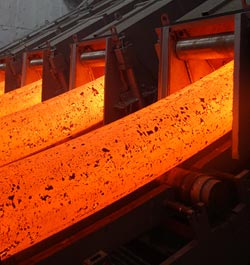Continuous bloom caster from Siemens goes on stream at Zenith Steel in China

Continuous bloom caster from Siemens at Changzhou Zhongtian Iron & Steel (Zenith Steel) in China.<br>
In July, Siemens Metals Technologies put a continuous bloom caster into operation at Chinese steel producer Changzhou Zhongtian Iron & Steel (Zenith Steel). The plant has an annual production capacity of around 1.3 million metric tons of blooms. Up to now Zenith has only produced billets. Blooms with diameters of 360, 400 and 500 millimeters are further processed into seamless pipes, while those with a diameter of 600 millimeters are used to produce forging steels.
Zenith Steel belongs to China's Top 20 steel producers. It is privately owned and runs an integrated iron and steel works in Changzhou, Jiangsu Province. The company's steel works has three BOF (LD) converters with a production capacity of 10 million metric tons of steel per year. Zenith Steel produces a wide range of end products, including steel pipes, bearing and spring steels, as well as a range of structural steels.
The five-strand casting plant built by Siemens is designed to produce round blooms with diameters ranging from 360 to 600 millimeters. It can cast structural steels, high-carbon, alloyed and low-alloyed steels, as well as pipe steel grades, at a speed of up to 0.8 meters a minute. The continuous casting plant has a machine radius of 14 meters and a metallurgical length of 32 meters. It is equipped with a curved casting mold, a DynaFlex hydraulic mold oscillator and LevCon mold level control. The drawing unit for rectangular blooms consists of three segments, and works with DynaGap Soft Reduction, preventing center segregation and ensuring that the interior quality of the blooms is homogeneous.
Siemens designed the continuous casting plant, supplied key components and technology packages, the complete basic and process automation, as well as the VAIQ quality management system. The scope of services also included advisory services during construction and commissioning, and customer training.
Further information on solutions for steel works, rolling mills and processing lines can be found at www.siemens.com/metals.
Follow us on Twitter: www.twitter.com/siemens_press
The Siemens Industry Sector (Erlangen, Germany) is the world's leading supplier of innovative and environmentally friendly products and solutions for industrial customers. With end-to-end automation technology and industrial software, solid vertical-market expertise, and technology-based services, the Sector enhances its customers' productivity, efficiency, and flexibility. With a global workforce of more than 100,000 employees, the Industry Sector comprises the Divisions Industry Automation, Drive Technologies and Customer Services as well as the Business Unit Metals Technologies. For more information, visit http://www.siemens.com/industry
The Metals Technologies Business Unit (Linz, Austria), part of the Siemens Industry Sector, is one of the world's leading life-cycle partners for the metals industry. The Business Unit offers a comprehensive technology, modernization, product and service portfolio as well as integrated automation and environmental solutions covering the entire life cycle of plants. For more information, visit http://www.siemens.com/metals
Reference Number: IMT201308496e
Contact
Mr. Rainer Schulze
Metals Technologies
Siemens AG
Turmstr. 44
4031 Linz
Austria
Tel: +49 (9131) 7-44544
rainer.schulze@siemens.com
Media Contact
More Information:
http://www.siemens.com/metals.All latest news from the category: Corporate News
Newest articles

First-of-its-kind study uses remote sensing to monitor plastic debris in rivers and lakes
Remote sensing creates a cost-effective solution to monitoring plastic pollution. A first-of-its-kind study from researchers at the University of Minnesota Twin Cities shows how remote sensing can help monitor and…

Laser-based artificial neuron mimics nerve cell functions at lightning speed
With a processing speed a billion times faster than nature, chip-based laser neuron could help advance AI tasks such as pattern recognition and sequence prediction. Researchers have developed a laser-based…

Optimising the processing of plastic waste
Just one look in the yellow bin reveals a colourful jumble of different types of plastic. However, the purer and more uniform plastic waste is, the easier it is to…



